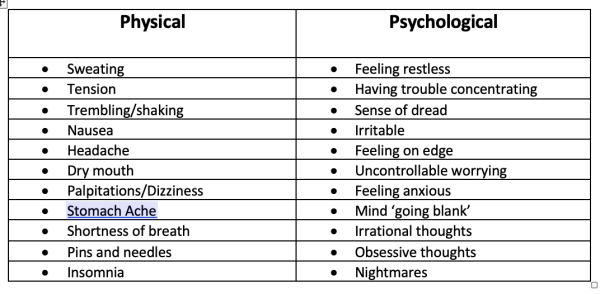5% of the UK population are affected by Generalised Anxiety Disorder [1] – that’s 1 in 20 people! The likelihood is either you, or someone you know, has experienced, or is currently experiencing, anxiety. It can be distressing to see loved ones suffer, and you may be asking yourself: “what can I do to help?” Read on to find out 5 ways you can support a loved one with anxiety. But first, what is anxiety?
What is anxiety?
Generalised Anxiety Disorder (GAD) is a long-term anxiety disorder that causes an individual to feel anxious about many things at once, most of the time. This means that a person is experiencing anxiety more of the time than not.
To read more about anxiety click here
Here are 5 ways you can help to support your friend:
1. Listen and Talk
If you notice a friend is suffering with anxiety, don’t be afraid to open up a conversation. Although the proverbial saying ‘a problem shared is a problem halved’ isn’t quite so literal; when it comes to mental health, sharing the burden of difficult thoughts can provide instant relief. Listen without judgement and interruption. Try to understand how their anxiety makes them feel and discuss some of the symptoms they are experiencing.
Anxiety can cause both physical and psychological symptoms, some of which are detailed in the table below. These symptoms can be very upsetting and have a real effect on an individual’s day to day life.
– Ask your friend what symptoms they experience so you can learn to recognise when they are struggling and may not feel able to ask for help.
– Ask your loved one what you can do to help. Your friend may know exactly what they need. It could be helping them with an important form they have to fill out, accompanying them to an appointment or offering a glass of water to help with symptoms. You could try some of the following techniques:
- Guided breathing
- Glass of water
- Get some fresh air
- Exercise
- Talk about something else
- Find somewhere quiet
2. Don’t try to fix them
Your loved one will need you as a friend, not a fixer, You are not a ‘knight in shining armour’. If your friend feels like you are trying to ‘fix’ them, they will feel like they are a problem and may stop sharing how they are feeling with you at a time when they need to reach out for help. You can support them through a difficult time, easing symptoms and letting them know that they are not alone. However, if you feel that your friend needs further help with their anxiety as it is starting to affect their daily life, try no. 3.
3. Encourage external support from professionals
There are many things that could be causing your friend’s anxiety, so it’s important they seek professional help if their symptoms are affecting their daily life. Although GAD can start for no reason, it could be caused by:
- Trauma
- Chemical imbalance in brain
- Genetic inheritance
- Chronic health condition
- Overactive areas on brain
- Substance misuse
Encourage your friend to book an appointment with their GP. Offer to phone and book the appointment if this is something that would support them in getting the help they need. A GP may recommend medication and/or a referral to a therapeutic treatment such as Cognitive Behavioural Treatment (CBT) which helps to re-programme thought processes to help relieve anxiety.
Do some research into support groups offered online and in the local community – GP surgeries will be able to signpost you to local services. Gather leaflets, websites, email addresses and phone numbers. By gathering all the information, you take the anxiety of having to look for these resources away from your friend. Joining a support group can help your friend to access professional help and advice from others also suffering with anxiety. You could offer to accompany your friend to their first group so that they have a familiar face with them.
4. Be patient
Anxiety isn’t something that goes away overnight, and it may cause a strain on your friendship if social plans are being cancelled, interactions become more difficult, or responses are just taking longer. Your friend cannot just ‘stop worrying’ no matter how much they’d like to be able to ‘turn off’ their anxious thoughts. You could use this time to develop your relationship, learning how to apply self-help together such as encouraging exercise and relaxation methods. You could become gym buddies or go to a meditation session together. Accountability and participation is easier when you are doing it with someone else, especially if it is someone you love.
5. Look after yourself
It is sad to see a friend struggling, but you cannot take responsibility for how they may be feeling. You are not there to ‘fix’ them, and you cannot help if you do not look after yourself. A common analogy is that if you have to put an oxygen mask on in a plane, you are instructed to put your own mask on before helping anyone else, even your own children. This is because if you cannot breathe, you cannot help someone else to breathe. You must come first, so make sure you are checking in with yourself and having your emotional and wellbeing needs met, as well as your friend’s. You should not feel guilty for taking time or space for yourself if things become too much. Do things that fulfil you and make you happy, and don’t offer to support your friend in ways that are detrimental to your own mental health.
[1] https://www.nhs.uk/mental-health/conditions/generalised-anxiety-disorder/overview/








Leave A Comment